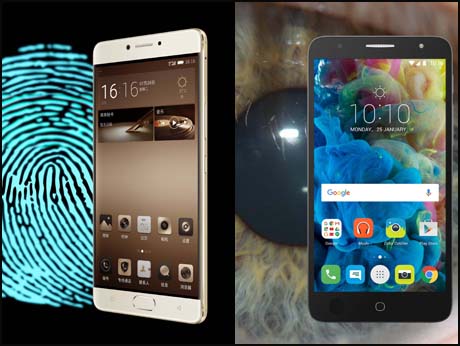
Smart phones now sport finger and eye scanners to protect the owner --offering exciting possibilities for authentication systems... we bring you two recent developments:
The eyes have IT
By Anand Parthasarathy in Bangalore
August 1 2016: When the Chinese TV and smart phone maker re-entered the India market last month, it chose as its first offering, a handset -- TCL 560 -- which offered a new way to unlock the device: Eye Verify. Pre-record a scan of iris -- and then 'look' into the selfie camera every time you want to open the phone... a fool proof way to prevent others from doing so.
Iris scans are now recognized as one of the most secure ways of authenticating a person's identity since no two persons have the identical iris. To ensure you get a good image, The 560 combines a 5 megapixel from camera with an 84 degree field of view, with a HD IPS display. In other ways, this is a fairly standard dual SIM 5.5 inch phone running the latest Android 6.0 OS -- but the onboard eye scanner, opens up the exciting possibility that the phone could be tweaked to become a personal tool for a variety of authentication applications -- banking, passport control and most usefully, Aadhaar.
With over 1 billion Aadhaar cards issued, covering 85% of India's population, this has emerged as the world's largest digital ID system -- but the infrastructure to do an Aadhaar based ID check is so woefully inadequate that card- holders are yet to reap the full benefits. If every Aadhaar card holder is able to perform self authentication with a phone, it will dramatically reduce dependence on common service centres.
In fact officials of the Unique Identification Authority of India, have initiated discussion with leading manufacturers to see how smartphones with iris and fingerprint scanners can be embedded with the software to perform Aadhaar authentication -- in effect making them personal and portable verification. stations. It could be a game-changer -- and a global innovation -- in much the same way that electronic voting machines were, in an earlier era.
Samsung has already put a UIDAI- approved iris scanner on a tablet for India for corporate use. Now TCL is signposting the way to make such technology even more ubiquitous by putting it on a Rs 7500 device, affordable by individuals.
Digital ungli chaap
By Vishnu Anand recently in Beijing
At a media event in the Chinese capital last week, Gionee previewed its flagship phone, the M6, with some of the tightest security features to appear on any handset. With smartphones increasingly used as payment platforms, the company has crafted an integrated hardware security solution that will debut in China-- then be offered in other large markets like India in versions that adhere to local regulations.
The M6 unveiled for its home market, houses an encrypted chip to secure the owners' personal data. This is because in China, there is no text message-based One Time Password or OTP. So the phone needs to ensure a secure financial transaction. To meet Indian regulation, the M6 that will be available in India before Diwali, will not feature this chip, but a front finger-print scanner and enhanced malware prevention. Gionee said it will work with the authorities in every country to localize such features to meet prevalent regulations. The M6 is a 5.5 inch full HD Android 6.0 phone with 4 GB RAM, 64 GM storage and a combination of 13 MP rear and 8 MP front cameras.
Meanwhile the two factor authentication using OTP may itself be under challenge. Last week, in new draft guidelines, the US National Institute of Standards Technology says it will no longer recommend using SMS for text messages for security purposes since there is risk that information may be intercepted or redirected. However not all experts agree: Kevin Panzavecchia, CTO of mobile network security experts HAUD argues that it is possible to fix the vulnerabilities associated with mobile network hacks, and that the benefits of the system still outweigh the negatives. "It is still the clear front runner", he says.
These trends will only hasten the day when our phones will provide the authoritative answer to the question: 'Am I , who I say I am?'